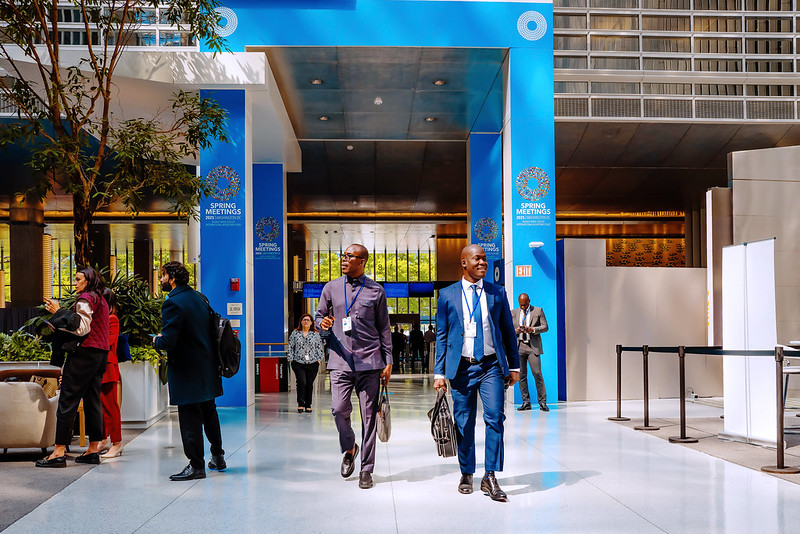
World Bank and IMF Spring Meetings 2025. Photo: Tolani Alli / World Bank (From The Bretton Woods Project)
In 2025, the International Finance Corporation (IFC), the private-sector arm of the World Bank Group (see Inside the Institutions, What is the International Finance Corporation (IFC)? ), launched its first review of the Sustainability Framework in over a decade – due to conclude in 2028. The Sustainability Framework, which includes the IFC’s Performance Standards (i.e. its environmental and social standards), due diligence practices, client responsibilities and grievance mechanisms, exerts influence far beyond the institution, as its standards currently underpin the Equator Principles used by over 130 global financial institutions to guide trillions of dollars in private lending and investment.
The review is unfolding in a context of declining official development assistance (ODA), with the Bank increasingly turning to mobilising private investment in an attempt to fill development financing gaps, while the IFC is under growing scrutiny for documented harms of its investments (see Observer Summer 2023). A 2025 investigation by Bloomberg revealed that IFC-funded private hospitals were allegedly responsible for serious human rights violations, including the detention of patients until they could pay their bills (see Observer Autumn 2025, Spring 2025). International civil society organisation (CSO) Recourse found in a 2023 report that an IFC-backed financial intermediary continued to channel money into coal projects, despite IFC’s and the World Bank Group’s climate commitments (see Observer Winter 2023). In Uganda, the Initiative for Social and Economic Rights (ISER) has shown that IFC’s support for private healthcare has exacerbated inequities, undermining health access for poor and vulnerable populations, thus constraining the capacity of states to meet their international human rights obligations. In education, IFC’s controversial investment in Bridge International Academies drew CSO criticism over high fees, poor quality and human rights violations (see Observer Spring 2022), resulting in a damning Compliance Advisor Ombudsman investigation, after which the IFC divested and promised remedy.
These cases underscore how noncompliance in IFC’s safeguards can directly harm communities and negatively impact the delivery of broader essential services which are at the core of state human rights obligations and essential for the stability of the social contract (see Observer Autumn 2025).
“Civil society groups engaging the IFC on this process are united in the view that the bank must make genuine reforms to enhance protections for communities, strengthen environmental commitments and enable remedy when projects go wrong,” highlighted Daniel Willis of Recourse.
Old flaws left unresolved
Since their adoption in 2012, the IFC’s Performance Standards have formally recognised the principle of Free, Prior and Informed Consent (FPIC) for Indigenous Peoples, though only in narrowly defined circumstances such as relocation, cultural heritage or resource extraction – far narrower than the UN Declaration of the Rights of Indigenous People. The Standards also introduced supply chain due diligence requirements for cases of child and forced labour and high-risk commodities. While these commitments were framed as mandatory, in reality obligations are tied to what is feasible given the client’s “management control or influence” and conditioned to making “commercially reasonable efforts.”
Many of the Framework’s shortcomings were flagged two years earlier: in 2010, during the consultation process on the draft Standards, the Office of the Compliance Advisor Ombudsman (CAO) – the IFC’s independent accountability mechanism – issued an advisory note warning that the proposed reforms lacked outcome accountability, relied too heavily on client self-reporting, and provided inadequate mechanisms for meaningful community participation. Similarly, CSOs highlighted key gaps in the Framework, particularly the lack of policies on human rights or climate change that risk leaving affected communities without reliable protections or access to remedy. When the Framework was finalised in 2012, the IFC largely ignored these recommendations, entrenching the very weaknesses its stakeholders had sought to correct.
“Time and again they willfully ignored findings of their own accountability mechanism – the CAO, protected their clients and walked away from taking responsibility or remedial action. That does not bestow any confidence in the institution or its processes”, noted Joe Athialy of the Centre for Financial Accountability.
Now the IFC has launched its second full review. According to IFC’s April 2025 Approach Paper, the review will focus on four pillars of the Framework: the Performance Standards, the Sustainability Policy, the Access to Information Policy, and the associated guidance notes. The IFC states that it intends to integrate “lessons from implementation”, align its standards with “evolving industry practices”, and respond to “new and emerging challenges”. However, CSOs have stressed that the Approach Paperis vague on how far the IFC is willing to go. In a December 2024 submission, they argued that the review must embed community-led remedy frameworks, and responsible exit principles – some of the key issues repeatedly raised by the CAO and CSOs since the last review.
A “generational” review or well-worn rhetoric?
Despite its ambitious framing, CSOs caution that the review risks devolving into a procedural update and therefore continue to emphasise the principle of non-regression. This comes in a wider context of erosion of accountability across multilateral development banks (MDBs), fuelled by the reliance private capital as expressed in the “Billions to Trillions” and Cascade approaches (see Observer Summer 2023). This shift elevates private finance while risking the weakening of safeguards and restricting avenues for community redress.
One of the most glaring gap concerns the remedy deficit. Communities harmed by IFC-backed projects have consistently struggled to secure remedy, even where CAO investigations confirmed the existence of harm. An external June 2020 World Bank review found that only 13 per cent of remedial actions taken by the IFC were deemed fully adequate, with nearly half rated unsatisfactory. The IFC points to its 2022 Remedial Action Framework as evidence of reform, yet groups such as EarthRights International have noted that it remains voluntary and investor-centred. It does not guarantee community participation in decision-making, nor does it obligate IFC to deliver remedy when its clients fail to do so.
Another persistent weakness lies in IFC’s responsible exit practices – the duty of financial institutions to ensure that when they withdraw from a project, they do so in a way that does not leave ongoing harms unaddressed, and that communities are not abandoned without remedy or accountability. Investigations by the CAO have shown the IFC has withdrawn from projects under active complaint processes, effectively walking away from its responsibilities and leaving communities without recourse. Yet the Approach Paper makes no reference to revisiting how IFC manages exits.
The IFC’s “fit-for-purpose” approach to environmental and social due diligence is also under fire. Introduced to streamline oversight, it applies tiered scrutiny depending on project type, meaning investments routed through financial intermediaries – which account for over 60 per cent of its portfolio – are subjected to far less rigorous checks. A July 2025 CAO compliance monitoring report showed that up to 35 per cent of IFC’s intermediary clients fail to comply with the Performance Standards, yet in many cases the IFC continues to fund them. This approach prioritises efficiency and volume over accountability, effectively creating double standards that allow harmful projects to slip through with minimal oversight.
Finally, the transparency gap remains unaddressed in the Framework. IFC’s lack of disclosure for sub-projects financed through intermediaries means affected people often learn of IFC’s involvement only after harm occurs. This opacity, flagged repeatedly since the CAO’s 2010 advisory, continues to undermine grievance mechanisms. While the review mentions enhancing disclosure, there is no proposal for full sub-project transparency, a cornerstone CSO demand.
“This review will have a major ripple effect across development and financial institutions, given the wide use of the Performance Standards in development and project finance. If the new framework fails to address gaps or even includes regressions on standards, it will send a dangerous signal that communities are expendable in the course of so-called ‘development’”, highlighted Stephanie Amoako of International Accountability Council. “If IFC wants to maintain its global leadership role, it must develop a revised Sustainability Framework that better protects people and the environment and ensures remedy for harm”, she added.
This article was originally published in The Bretton Woods Project, and you can read here.
Centre for Financial Accountability is now on Telegram and WhatsApp. Click here to join our Telegram channel and click here to join our WhatsApp channel, and stay tuned to the latest updates and insights on the economy and finance.

